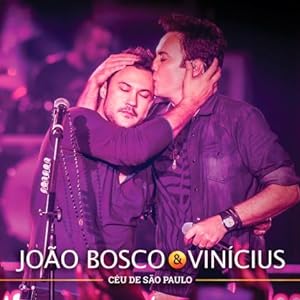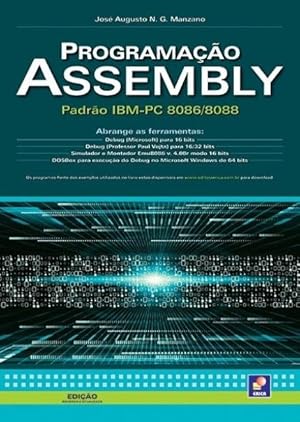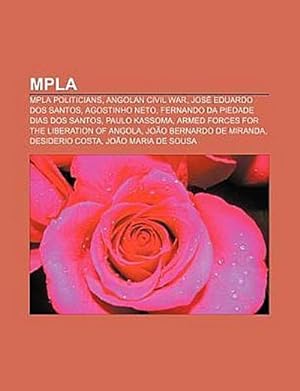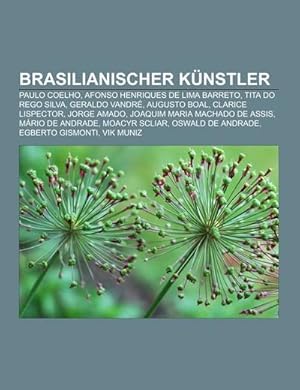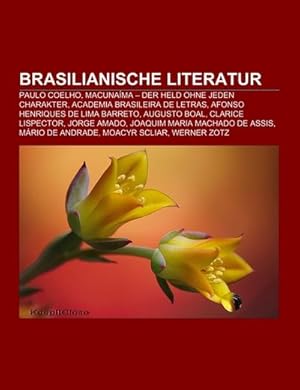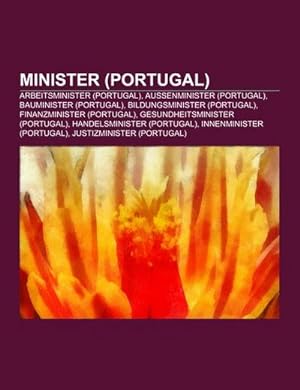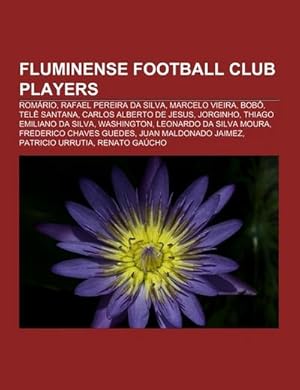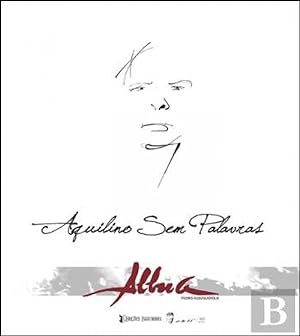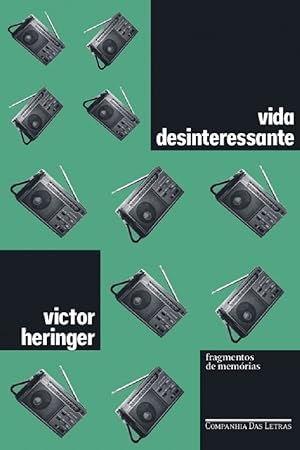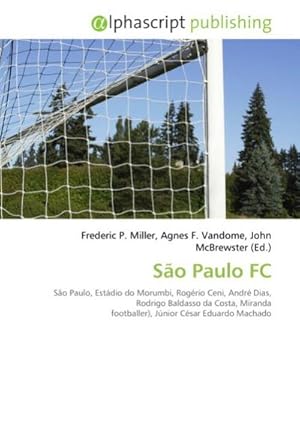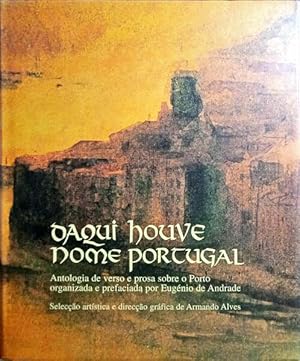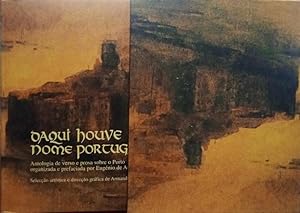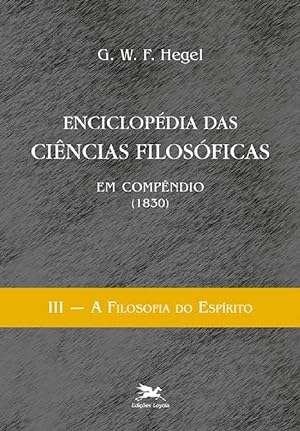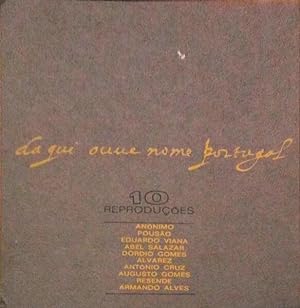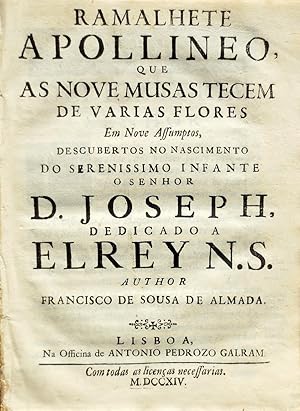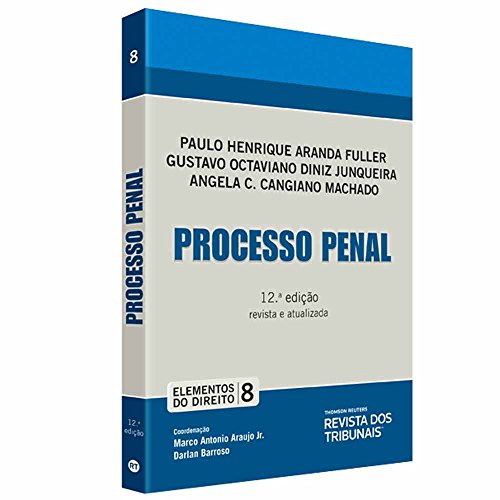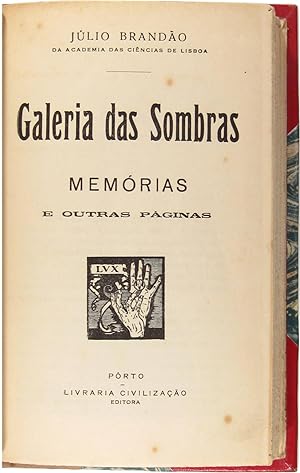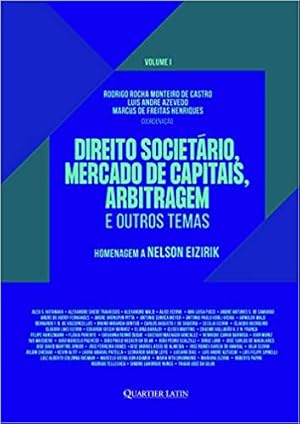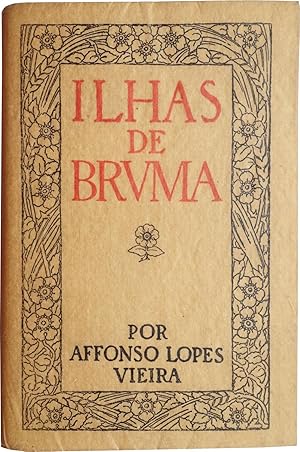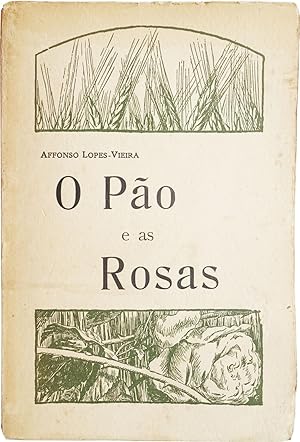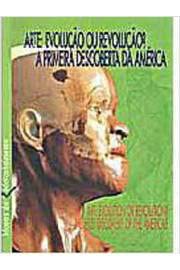Paulo Henrique Machado (32 results)
Product Type
- All Product Types
- Books (32)
- Magazines & Periodicals
- Comics
- Sheet Music
- Art, Prints & Posters
- Photographs
- Maps
-
Manuscripts &
Paper Collectibles
Condition
Binding
Collectible Attributes
Seller Location
Seller Rating
-
O anjo proscrito. -- ( Contar ; 6 )
Published by Corisco, Teresina
Seller: Ventara SA, Montevideo, Uruguay
Tapa Blanda. Condition: New. Traz cinco contos do autor piauiense, também autor de "Tá pronto, seu lobo" (1978) e "A paz do pântano" (1982). 23 Páginas. 40 gr. Libro.
-
Tá pronto seu lobo? : poemas.
Published by Corisco, Teresina
Seller: Ventara SA, Montevideo, Uruguay
Tapa Blanda. Condition: New. Grande parte dos poemas que constituem este livro são flashes da cidade de Teresina, publicado pela primeira vez em 1978. Prólogo: Airton Sampaio. Paulo Machado também é autor de "A paz do pântano" (1982). 69 Páginas. 90 gr. Libro.
-
Condition: New. A dupla João Bosco e VinÃcius lança seu novo CD intitulado â Cà u de São Pauloâ , pela Radar Records e homenageia a cidade que sempre acolhe milhares de pessoas e que os amigos tanto amam. O projeto foi gravado no dia 01 de junho em um evento fechado no Espaço das Amà ricas / SP. O álbum marca uma nova fase na trajetà ria dos cantores. O repertà rio conta com 20 faixas e traz músicas inà ditas, alguns hits e uma releitura de um grande sucesso dos anos 80 a música â Perigoâ (Nico Rezende / Paulinho Lima). Como à um momento especial, algumas das canções não poderiam ser diferentes. O CD conta com participações de grandes nomes do cenário sertanejo - Cà sar Menotti e Fabiano, Jorge e Mateus e Henrique e Juliano que dão o ponta pà inicial nesse projeto com o hit â Deixa a gente quietoâ (Rafael Torres | Michel Alves | Ruan Soares). Ainda nesse clima de romance destacam-se â Eu não fumava, eu não bebia â (Bruno Morais / Reinaldo Meirelles) e â Não fez por merecerâ que conta com a participação de Jorge e Mateus (Fred Liel / Debora Xavier / Euler Coelho). As mais agitadas ficam para â Que bar que cê táâ (Thiago Machado / Junior Califa / Euler Coelho), â Entrega o ouroâ (Diego de Souza / Juliano Freitas) e â Programa de casalâ com Cà sar Menotti e Fabiano (Euller Coelho). A balada continua com â Meia voltaâ (Euler Coelho / Higor Mendes), â Sem esperar â (Thiago Machado / Junior Califa / Euler Coelho), â Queda por errosâ (Reinaldo Meirelles / Anna Nery / Bruno Morais / Matheus Torres ), â Cà u de São Pauloâ (Fred Liel / Debora Xavier), â Vaidadesâ (Fred Liel / Debora Xavier/ Euler Coelho), â O foraâ (Adriano Bernardes / Sergio Porto), â Buquê de floresâ (FabrÃcio Matias / Cida Rocha / Pacato), â Coração na mãoâ (Marcos Paulo /Alex Torricelli), â HD infinitoâ (Matheus Aleixo/ Felipe Oliver), â Vazioâ (Elias Muniz), â Ponto Fracoâ (Diego de Souza / Juliano Freitas), Pouti-Porri â Magia e Mistà rio/ Quero provar que te amoâ (Ernani Ferreira / Joe Euler Coelho) e â Amiga lindaâ (Euler Coelho/ Fred Liel / Debora Xavier). CaracterÃsticasAltura 12.50 cm Ano de Produção 2016 Cà d. Barras 7899340745893 Duração Aproximada 64 min. Idioma do à udio Português Largura 14.00 cm Marca R & S PaÃs de Produção Brasil Peso 0.100 Kg Profundidade 1.00 cm Referência RAD4589 Tipo de MÃdia CD.
-
Condition: New. A dupla João Bosco e VinÃcius lança seu novo CD intitulado Cà u de São Paulo, pela Radar Records e homenageia a cidade que sempre acolhe milhares de pessoas e que os amigos tanto amam. O projeto foi gravado no dia 01 de junho em um evento fechado no Espaço das Amà ricas / SP. O álbum marca uma nova fase na trajetà ria dos cantores. O repertà rio conta com 20 faixas e traz músicas inà ditas, alguns hits e uma releitura de um grande sucesso dos anos 80 a música ¿Perigo¿ (Nico Rezende / Paulinho Lima). Como à um momento especial, algumas das canções não poderiam ser diferentes. O CD conta com participações de grandes nomes do cenário sertanejo como Cà sar Menotti e Fabiano, Jorge e Mateus e Henrique e Juliano que dão o ponta pà inicial nesse projeto com o hit "Deixa a gente quieto" (Rafael Torres/Michel Alves/Ruan Soares). O clipe já ultrapassou 22 milhões de views. Ainda nesse clima de romance destacam-se "Eu não fumava, eu não bebia" (Bruno Morais/Reinaldo Meirelles) e "Não fez por merecer" que conta com a participação de Jorge e Mateus (Fred Liel/Debora Xavier/Euler Coelho). As mais agitadas ficam para 'Que bar que cê tá" (Thiago Machado/Junior Califa/Euler Coelho), "Entrega o ouro" (Diego de Souza/Juliano Freitas) e "Programa de casal" com Cà sar Menotti e Fabiano (Euller Coelho). Faixas01 - Meia Volta02 - Sem Esperar03 - Não Fez Por Merecer - Part. Jorge & Mateus04 - Que Bar Que Cê Tá05 - Queda Por Erros06 - Cà u De São Paulo07 - Entrega O Ouro08 - Vaidades09 - Perigo10 - O Fora11 - Programa de Casal - Part. Cà sar Menotti & Fabiano12 - Buquê de Flores13 - Coração na Mão14 - Eu Não Fumava, Eu Não Bebia15 - HD Infinito16 - Vazio17 - Deixa A Gente Quieto - Part. Henrique & Juliano18 - Ponto Fraco19 - Magia e Mistà rio/Quero Provar Que Te Amo20 - Amiga Linda.
-
MPLA
Published by Reference Series Books LLC Jun 2011, 2011
ISBN 10: 123245933XISBN 13: 9781232459330
Seller: BuchWeltWeit Ludwig Meier e.K., Bergisch Gladbach, Germany
Book Print on Demand
Taschenbuch. Condition: Neu. This item is printed on demand - it takes 3-4 days longer - Neuware -Source: Wikipedia. Pages: 29. Chapters: MPLA politicians, Angolan Civil War, José Eduardo dos Santos, Agostinho Neto, Fernando da Piedade Dias dos Santos, Paulo Kassoma, Armed Forces for the Liberation of Angola, João Bernardo de Miranda, Desiderio Costa, João Maria de Sousa, Fernando José de França Dias Van-Dúnem, Iko Carreira, Assunção dos Anjos, Viriato da Cruz, Daniel Chipenda, Bicesse Accords, Lopo do Nascimento, Nito Alves, Francisco Higino Carneiro, Pitra Neto, Mário Pinto de Andrade, Kundy Pahiama, Afonso Van-Dúnem M'Binda, Juilão Mateus Paulo, Antonio Dias Cardoso, Marcolino Moco, Hélder Vieira Dias, Roberto Leal Monteiro, Joaquim Pinto de Andrade, Francisco Romão, Angolan Communist Party, Maria Mambo Café, António Alberto Neto, Lúcio Lara, Henrique de Carvalho Santos, Ilidio Machado, Gentil Ferreira Viana, Valentim Amões, Rui de Sá, Party of the United Struggle for Africans in Angola, Aliceres Mango, Youth of MPLA, Democratic Front for the Liberation of Angola, Movement for the National Independence of Angola. Excerpt: The Angolan Civil War (1975-2002) began immediately after Angola became independent from Portugal in November 1975. Prior to this, a decolonisation conflict had taken place in 1974-75, following the Angolan War of Independence of 1961-74. The Civil War was primarily a fight for power between two former liberation movements, the People's Movement for the Liberation of Angola (MPLA) and the National Union for the Total Independence of Angola (UNITA), who each had different roots in the Angolan social fabric and mutually incompatible leaderships. Both the MPLA and UNITA had socialist leanings, but for the purpose of mobilising international support posed as 'Marxist-Leninist' and 'anti-communist', respectively. A third former movement, the National Front for the Liberation of Angola (FNLA), having fought the MPLA alongside UNITA during the war for independence, played almost no role in the Civil War. Finally, a Front for the Liberation of the Enclave of Cabinda FLEC, an association of separatist militant groups, fought for the independence of Cabinda. The war can be divided roughly into three periods of major fighting - between 1975 and 1991, 1992 and 1994, and 1998 and 2002 - broken up by fragile periods of peace. By the time the war was brought to an end in 2002, after 27 years, an estimated 500,000 people had been killed, over one million had fled from rural to urban areas, massive damage had been done to Angola's infrastructure, and the nation's public administration, economic enterprises and even religious institutions were in many places in shambles. The Angolan Civil War reached such dimensions due to massive foreign intervention being combined with its internal dynamics. Both the Soviet Union and the United States considered it critical to the global balance of power and to the outcome of the Cold War, and they and some of their allies put significant effort into making it a proxy war between their two power blocs. The Angolan Civil War ultimately became one of 32 pp. Englisch.
-
Brasilianischer Künstler
Published by Reference Series Books LLC Sep 2012, 2012
ISBN 10: 1158779968ISBN 13: 9781158779963
Seller: BuchWeltWeit Ludwig Meier e.K., Bergisch Gladbach, Germany
Book Print on Demand
Taschenbuch. Condition: Neu. This item is printed on demand - it takes 3-4 days longer - Neuware -Quelle: Wikipedia. Seiten: 42. Kapitel: Paulo Coelho, Afonso Henriques de Lima Barreto, Tita do Rego Silva, Geraldo Vandré, Augusto Boal, Clarice Lispector, Jorge Amado, Joaquim Maria Machado de Assis, Mário de Andrade, Moacyr Scliar, Oswald de Andrade, Egberto Gismonti, Vik Muniz, Liste brasilianischer Schriftsteller, João Guimarães Rosa, João Ubaldo Ribeiro, Nelson Pereira dos Santos, Fernando Bastos de Ávila, Magda Tagliaferro, Lasar Segall, Darcy Ribeiro, Netinho de Paula, Carlos Drummond de Andrade, Manuel Bandeira, Beatriz Milhazes, Laudelino Freire, Euclides da Cunha, Lya Luft, Manuel de Araújo Porto-alegre, Zé do Rock, Alexandre Murucci, Álvares de Azevedo, José de Alencar, José Mauro de Vasconcelos, Iole de Freitas, Marina Colasanti, Vinícius de Moraes, Luiz Aquila, Eduardo Kac, Lygia Bojunga Nunes, Raimundo Carrero, Lêdo Ivo, Jac Leirner, Francisco de Almeida Fleming, Cildo Meireles, Augusto dos Anjos, Clara Nunes, Ricardo Basbaum, Nelson Hoffmann, Leonardo Villar, Henrique Maximiano Coelho Neto, Paulo Lins, Alphonsus de Guimaraens, Lindanor Celina, Grupo Corpo, Marcelo Lago. Auszug: Paulo Coelho ( 24. August 1947 in Rio de Janeiro) ist ein brasilianischer Schriftsteller und Bestseller-Autor. Paulo Coelho wurde 1947 in eine gutbürgerliche brasilianische Familie hineingeboren, sein Vater Pedro ist Ingenieur, seine Mutter Lydia Hausfrau. Er hat eine ältere Schwester namens Sonia. Paulo Coelhos Leben war von Beginn an religiös geprägt. Als siebenjähriger Junge besuchte er die Jesuitenschule San Ignacio in Rio de Janeiro, in der er bei einem schulischen Lyrikwettbewerb einen Preis erhielt. Coelho studierte Rechtswissenschaften gegen den Wunsch seines Vaters, der ihn gerne in seinen Fußstapfen als Ingenieur gesehen hätte, unterbrach 1970 jedoch sein Studium, um als Hippie eine zweijährige Weltreise durch Südamerika, Nordafrika und Europa zu unternehmen. Coelhos anschließende Tätigkeit als Theater- und Drehbuchautor sowie sein in dieser Zeit währender Drogenkonsum wurden von seinen streng katholischen und konservativen Eltern scharf verurteilt. Sein rebellisches Aufbegehren gegen die Vorstellungen und Ziele seiner Eltern führte aufgrund der Annahme, ihr Sohn sei geistesgestört, zu insgesamt drei Einweisungen in die psychiatrische Anstalt Casa de Saúde Dr. Eiras (1966, 1967 und 1968), wo er auch mit Elektrokrampftherapie behandelt wurde. Die Erfahrung stationärer psychiatrischer Behandlung schilderte er später in seinem Roman Veronika beschließt zu sterben. Coelho war und ist politisch tätig. Gemeinsam mit dem Musiker Raul Seixas wurde Coelho 1973 Mitglied der antikapitalistischen Alternativen Gesellschaft , die Freiheit und Selbstbestimmung propagierte und in der magische Rituale praktiziert wurden. Coelho engagierte sich in dieser Zeit für eine Comicserie, genannt Kring-ha , die ebenfalls für mehr Freiheit im vom Militär regierten brasilianischen Staat eintrat. Aufgrund der möglichen Gefahr einer Oppositionsbildung verhaftete das Militärregime die beiden Männer 1974. Zwei Tage nach seiner Freilassung wurde Coelho von einer paramilitärischen Orga 42 pp. Deutsch.
-
Brasilianische Literatur
Published by Reference Series Books LLC Dez 2011, 2011
ISBN 10: 1158918410ISBN 13: 9781158918416
Seller: BuchWeltWeit Ludwig Meier e.K., Bergisch Gladbach, Germany
Book Print on Demand
Taschenbuch. Condition: Neu. This item is printed on demand - it takes 3-4 days longer - Neuware -Quelle: Wikipedia. Seiten: 52. Kapitel: Paulo Coelho, Macunaíma Der Held ohne jeden Charakter, Academia Brasileira de Letras, Afonso Henriques de Lima Barreto, Augusto Boal, Clarice Lispector, Jorge Amado, Joaquim Maria Machado de Assis, Mário de Andrade, Moacyr Scliar, Werner Zotz, João Simões Lopes Neto, Oswald de Andrade, Ferreira Gullar, Liste brasilianischer Schriftsteller, João Guimarães Rosa, Antonio Callado, Fernando Sabino, João Ubaldo Ribeiro, Chico Buarque, Literatura de Cordel, O Guarani, Darcy Ribeiro, Maria Firmina dos Reis, Vítor Viana, Dom Casmurro, Prêmio Machado de Assis, Carlos Drummond de Andrade, Manuel Bandeira, Osman Lins, Olavo Bilac, José Carlos de Lima Vaz, Laudelino Freire, Euclides da Cunha, Lya Luft, Roberto Schwarz, Manuel de Araújo Porto-alegre, Zé do Rock, Afonso Arinos, Álvares de Azevedo, José de Alencar, Leandro Müller, Ariano Suassuna, José Mauro de Vasconcelos, Prêmio Juca Pato, Marina Colasanti, Vinícius de Moraes, Zélia Gattai, Lygia Bojunga Nunes, Lêdo Ivo, Luiz Alfredo Garcia-Roza, Prêmio Jabuti de Literatura, Roberto Freire, José de Mesquita, Iracema, Festa Literária Internacional de Paraty, Augusto dos Anjos, Nelson Hoffmann, Dina Mangabeira, Guilherme de Almeida, Henrique Maximiano Coelho Neto, Der Zahir, Paulo Lins, Alphonsus de Guimaraens, Lindanor Celina, Florêncio Carlos de Abreu e Silva. Auszug: Paulo Coelho ( 24. August 1947 in Rio de Janeiro) ist ein brasilianischer Schriftsteller und Bestseller-Autor. Paulo Coelho wurde 1947 in eine gutbürgerliche brasilianische Familie hineingeboren, sein Vater Pedro ist Ingenieur, seine Mutter Lydia Hausfrau. Er hat eine ältere Schwester namens Sonia. Paulo Coelhos Leben war von Beginn an religiös geprägt. Als siebenjähriger Junge besuchte er die Jesuitenschule San Ignacio in Rio de Janeiro, in der er bei einem schulischen Lyrikwettbewerb einen Preis erhielt. Coelho studierte Rechtswissenschaften gegen den Wunsch seines Vaters, der ihn gerne in seinen Fußstapfen als Ingenieur gesehen hätte, unterbrach 1970 jedoch sein Studium, um als Hippie eine zweijährige Weltreise durch Südamerika, Nordafrika und Europa zu unternehmen. Coelhos anschließende Tätigkeit als Theater- und Drehbuchautor sowie sein in dieser Zeit währender Drogenkonsum wurden von seinen streng katholischen und konservativen Eltern scharf verurteilt. Sein rebellisches Aufbegehren gegen die Vorstellungen und Ziele seiner Eltern führte aufgrund der Annahme, ihr Sohn sei geistesgestört, zu insgesamt drei Einweisungen in die psychiatrische Anstalt Casa de Saúde Dr. Eiras (1966, 1967 und 1968), wo er auch mit Elektrokrampftherapie behandelt wurde. Die Erfahrung stationärer psychiatrischer Behandlung schilderte er später in seinem Roman Veronika beschließt zu sterben. Coelho war und ist politisch tätig. Gemeinsam mit dem Musiker Raul Seixas wurde Coelho 1973 Mitglied der antikapitalistischen Alternativen Gesellschaft , die Freiheit und Selbstbestimmung propagierte und in der magische Rituale praktiziert wurden. Coelho engagierte sich in dieser Zeit für eine Comicserie, genannt Kring-ha , die ebenfalls für mehr Freiheit im vom Militär regierten brasilianischen Staat eintrat. Aufgrund der möglichen Gefahr einer Oppositionsbildung verhaftete das Militärregime die beiden Männer 1974. Zwei Tage nach seiner Freilassung wurde Coelho von einer paramilitärischen Orga 52 pp. Deutsch.
More buying choices from other sellers on AbeBooks
New offers from US$ 19.62
-
Minister (Portugal)
Published by Reference Series Books LLC Nov 2012, 2012
ISBN 10: 1231761474ISBN 13: 9781231761472
Seller: BuchWeltWeit Ludwig Meier e.K., Bergisch Gladbach, Germany
Book Print on Demand
Taschenbuch. Condition: Neu. This item is printed on demand - it takes 3-4 days longer - Neuware -Quelle: Wikipedia. Seiten: 72. Kapitel: Arbeitsminister (Portugal), Außenminister (Portugal), Bauminister (Portugal), Bildungsminister (Portugal), Finanzminister (Portugal), Gesundheitsminister (Portugal), Handelsminister (Portugal), Innenminister (Portugal), Justizminister (Portugal), Kulturminister (Portugal), Landwirtschaftsminister (Portugal), Minister für Kolonien (Portugal), Minister für Parlamentsangelegenheiten (Portugal), Minister für Präsidentschaftsangelegenheiten (Portugal), Umweltminister (Portugal), Verkehrsminister (Portugal), Verteidigungsminister (Portugal), Wirtschaftsminister (Portugal), Wissenschaftsminister (Portugal), José Manuel Barroso, José Dias Ferreira, João Carlos de Saldanha Oliveira e Daun, António de Oliveira Salazar, António Bernardo da Costa Cabral, José Sócrates, Pedro de Sousa Holstein, José Domingues dos Santos, José Norton de Matos, José Luciano de Castro, Nuno José Severo de Mendonça Rolim de Moura Barreto, Francisco Pinto da Cunha Leal, Bernardo de Sá Nogueira de Figueiredo, Afonso Augusto da Costa, Bernardino Machado, Filomeno da Câmara de Melo Cabral, Manuela Ferreira Leite, Paulo Portas, Francisco Pinto Balsemão, Sidónio Pais, Manuel Maria Coelho, António Correia de Campos, José Lúcio Travassos Valdez, José António de Melo Pinto Ribeiro, Diogo Freitas do Amaral, Mário Lino, João de Deus Pinheiro, Teófilo Duarte, Mário Sottomayor Cardia, António Costa, António Maria da Silva, Manuel da Silva Passos, Alfredo de Sá Cardoso, Manuel Pinho, Mariano Gago, Alberto Bernardes Costa, Carlos Mota Pinto, Marcelo Caetano, José Vicente Barbosa du Bocage, Maria de Lurdes Rodrigues, Jaime Gama, Ana Jorge, António Caetano de Abreu Freire Egas Moniz, Francisco José Fernandes Costa, Rui Pereira, Álvaro Cunhal, António José de Ávila, Isaltino Morais, Anselmo José Braamcamp, José Caeiro da Mata, Augusto Santos Silva, Liberato Ribeiro Pinto, Eduardo Augusto Marques, António de Almeida Santos, Nuno Severiano Teixeira, Luís Marques Mendes, Alfredo Rodrigues Gaspar, Pedro Silva Pereira, Fernando Teixeira dos Santos, Luís Valente de Oliveira, José Vieira da Silva, Armindo Rodrigues de Sttau Monteiro, Isabel Pires de Lima, Tomé José de Barros Queirós, Francisco Nunes Correia, António Cardoso e Cunha, Gonçalo Ribeiro Telles, Ernâni Lopes, António Rodrigues Sampaio, Joaquim Pedro de Oliveira Martins, Victor Hugo de Azevedo Coutinho, António José de Almeida, Henrique Chaves, Augusto de Vasconcelos, Luís Campos e Cunha, Jaime Silva, António Vitorino, Francisco António da Veiga Beirão, João Tamagnini de Sousa Barbosa, Carlos Maia Pinto, Manuel Joaquim Pinheiro Chagas, José Carlos de Mascarenhas Relvas, Duarte Leite Pereira da Silva, Luís Filipe Marques Amado, Brito Camacho, Ernesto Melo Antunes, António Teixeira de Sousa, Artur Alberto de Campos Henriques, António Maria Baptista, João Crisóstomo de Abreu e Sousa, Júlio Dantas. Auszug: José Dias Ferreira ( 30. November 1837 in Pombeira da Beira (Arganil); 8. September 1909 in Vidago (Chaves (Portugal)) war ein portugiesischer Rechtswissenschaftler, Politiker und Premierminister (Presidente do Conselho de Ministros) während der Zeit der konstitutionellen Monarchie. Die Juristische Fakultät der Universität CoimbraDer Sohn von Kleinbauern sollte ursprünglich eine Laufbahn als Priester absolvieren und begann zunächst vorbereitende Studien der Lateinischen Sprache. Bereits im Alter von noch vierzehn Jahren erfolgte 1852 seine Immatrikulation an der Fakultät für Theologie an der Un. 72 pp. Deutsch.
-
Fluminense Football Club players
Published by Reference Series Books LLC Feb 2012, 2012
ISBN 10: 1155620690ISBN 13: 9781155620695
Seller: BuchWeltWeit Ludwig Meier e.K., Bergisch Gladbach, Germany
Book Print on Demand
Taschenbuch. Condition: Neu. This item is printed on demand - it takes 3-4 days longer - Neuware -Source: Wikipedia. Pages: 93. Chapters: Romário, Rafael Pereira da Silva, Marcelo Vieira, Bobô, Telê Santana, Carlos Alberto de Jesus, Jorginho, Thiago Emiliano da Silva, Washington, Leonardo da Silva Moura, Frederico Chaves Guedes, Juan Maldonado Jaimez, Patricio Urrutia, Renato Gaúcho, Valdir Pereira, Carlos Alberto Torres, Fábio Noronha, Ricardo Pinto, Sérgio Manoel, Abel Braga, Wellington Alves da Silva, Gérson, Vampeta, Ricardo Roberto Barreto da Rocha, Ademir Marques de Menezes, Mário Sérgio Pontes de Paiva, Ricardo Gomes, Moisés Matias de Andrade, Odvan, Uidemar, Diego de Souza Andrade, Rafael Moura, Joubert Araújo Martins, Diego Cavalieri, Paulo César Lima, Julio César Romero, Wilson Gottardo, Dodô, Roberto Rivelino, Juliano Roberto Antonello, João Soares de Almeida Neto, Thiago Neves Augusto, Aílton dos Santos Ferraz, Sérgio Araújo, Leandro Amaral, Luis Artime, Ramon Menezes Hubner, Antônio Rinaldo Gonçalves, Tuta, Jorge Luiz dos Santos Dias, Bismarck Barreto Faria, Darío Conca, Luiz Alberto da Silva Oliveira, André Luiz Moreira, Luís Carlos Tóffoli, Clemerson de Araújo Soares, Rodrigo Tiuí, Percy Olivares, Zequinha, Branco, Roger Galera Flores, Magno Alves, Rodolfo Dantas Bispo, Caio Ribeiro Decoussau, Delei, Toró, Wanderson de Paula Sabino, Carlos Roberto Cabral, Alfinete, César Cervo Luca, Mattinho, Fabiano Eller, Gilberto Alves, Eduardo Ratinho, Paulo César Arruda Parente, Filipe Machado, Vanderson da Silva Souza, Gabriel Rodrigues dos Santos, Miodrag Andelkovic, Ezequiel González, Leandro Silva Wanderley, Leonardo Sciammarella Neto, Cafuringa, Hércules de Miranda, Edino Nazareth Filho, Luciano Andrade Rissutt, Alex Terra, Bigode, Elias Ribeiro de Oliveira, Nélio da Silva Melo, Fábio de Jesus, Pedro Paulo de Oliveira, Zetti, Maurício Fernandes, José Jadílson dos Santos Silva, Cláudio Pitbull, Rogério Fidélis Régis, Paulinho Cascavel, Jaílton, Alessandro Nunes, Alexandre Paes Lopes, Hugo Henrique Assis do Nascimento, Fernando Gomes de Jesus, Cássio Alessandro de Souza, Macula, Roniéliton dos Santos, Cícero Santos, Paulo Madeira, Paulo César Vieira Rosa, André Lima, Donizete Francisco de Oliveira, Dorvalino Alves Maciel, Ronaldo Soares Giovanelli, Marinho Chagas, Dirceu, Darcy Dolce Neto, André Luís Garcia, Djair Kaye de Brito, Alcindo Sartori, Josemar dos Santos Silva, Edson Edmar Dias de Souza, Agnaldo Cordeiro Pereira, Felipe Jorge Loureiro, Roberto Brum, Maicon Pereira de Oliveira, Thiago Sales, Adriano Bizerra Melo, Leo Percovich, Danrlei, Éverton Santos, Mauro Rafael da Silva, André Ronaldo de Souza Esposito, Maicon Marques Bitencourt, Alex Dias de Almeida, Narciso Horacio Doval, Junio César Arcanjo, Leandro Ávila, Romeu Pereira dos Santos, Júlio César da Silva e Souza, Cláudio Adão, Kleber Guerra, Gabriel dos Santos Nascimento, Elinton Andrade, Éder Luciano, Uendel Pereira Gonçalves, Leandro Lessa Azevedo, Jean Carlos Dondé, Marcelo Macedo Ferreira, Edcarlos, Rui Campos, João Batista Nunes, Harry Welfare, Juliano Mineiro Fernandes, Wélton Araújo Melo, Willamis de Souza Silva, Nikola Damjanac, Osmar Ferreira Júnior, Evando, Adeílson Pereira de Mello, Hiziel Souza Soares, Leandro da Fonseca Euzebio, Júlio César Coelho de Moraes Júnior, Gabriel Lima, Fernando Henrique dos Anjos, Wilton Cezar Xavier, Jancarlos de Oliveira Barros, Carlos José Castilho, Alan Carvalho, Rogério Pinheiro dos Santos, Antônio Carlos dos Santos Aguiar, Hugo Alves Velame, Chrys, Rodrigo Batista da Cruz, Darci Miguel Monteiro, Nílson Esidio Mora, Ru. 94 pp. Englisch.
More buying choices from other sellers on AbeBooks
New offers from US$ 27.31
-
Aquilino sem palabras
Published by EDIÇOES ESGOTADAS, 2016
ISBN 10: 9898801484ISBN 13: 9789898801487
Seller: Imosver, PONTECALDELAS, Spain
Book
Condition: Nuevo. "Aquilino sem Palavras" contém mais de 200 trabalhos plásticos inéditos de Albuq - Pedro Albuquerque sobre o mundo aquiliniano, integrando uma separata, "Aquilino com Palavras", que inclui ensaios de nomes como António Valdemar, Martim de Gouveia e Sousa, José Carlos Seabra Pereira, Fernando Paulo Baptista, Aquilino Machado, Henrique Almeida, Rodrigues Vaz , Agostinho Ribeiro, Jerónimo Costa, António Manuel Ferreira, entre outros, sobre Aquilino e o pintor mencionado.
-
Vida desinteressante - Fragmentos de memórias
Published by Companhia das Letras, 2022
ISBN 10: 6559213498ISBN 13: 9786559213498
Seller: Livraria Ingá, Niterói, RJ, Brazil
Book
Paperback. Condition: New. New; Nesta reunião de textos mistura de memórias, ensaios, anotações e crônicas , uma das mentes mais brilhantes de sua geração entremeia literatura, poesia, filosofia e política para refletir sobre si mesmo, mas também sobre as transformações do mundo ao seu redor.Entre fevereiro de 2014 e maio de 2017, Victor Heringer assinou setenta textos para o site da Revista Pessoa. Na coluna "Milímetros", o escritor registrou um pouco de tudo: o cotidiano, as referências literárias, a infância no Rio de Janeiro, a mudança para São Paulo, as novas e as velhas amizades, os sebos, as viagens, a política, o noticiário e um Brasil em franca ebulição.Vida desinteressante traz uma prosa situada entre memórias, ensaios, anotações e crônicas ou anticrônicas, como aponta Carlos Henrique Schroeder, que assina a organização e a apresentação deste volume. São pensamentos luminosos de um escritor inquieto, que absorvia, a quente, as transformações de um mundo trepidante e de um país às vésperas do colapso.As reflexões oscilam entre a ironia mordaz e a ternura funda, sem nunca deixar de lado o estilo irresistível, perspicaz e de rara sensibilidade, que remete a Machado de Assis, Manuel Bandeira, Oswald de Andrade, Lydia Davis, Carlos Drummond de Andrade e Hilda Hilst.; 264 pages.
-
São Paulo FC
Published by Alphascript Publishing
ISBN 10: 6130028423ISBN 13: 9786130028428
Seller: BuchWeltWeit Ludwig Meier e.K., Bergisch Gladbach, Germany
Book Print on Demand
Taschenbuch. Condition: Neu. This item is printed on demand - it takes 3-4 days longer - Neuware -São Paulo FC, São Paulo, Estádio do Morumbi, Rogério Ceni, André Dias, Rodrigo Baldasso da Costa, Miranda (footballer), Júnior César Eduardo Machado, Jorge Wagner, Eduardo Costa, Washington Stecanela Cerqueira, Hernanes, Marcos Arouca da Silva, Denis César de Matos, Renato Assis da Silva, Jean Raphael Vanderlei Moreira, Marlos Romero Bonfim, Humberlito Borges Teixeira, Hugo Henrique Assis do Nascimento, André Lima, Richarlyson Barbosa Felisbino, João Bosco de Freitas Chaves, José Luís Santos da Visitação, Dagoberto, Sergio Mota, Wellington Aparecido Martins, Oscar dos Santos Emboaba Junior, Aislan, Fabiano Ribeiro de Freitas, List of São Paulo Futebol Clube players, List of São Paulo Futebol Clube managers 120 pp. Englisch.
-
Hard Cover. Condition: Good. Antologia de verso e prosa sobre o Porto, organizada e prefaciada por Eugénio de Andrade. Selecção artística e direcção gráfica de Armando Alves. 4.ª Edição. Edições Asa. Porto. 2000. De 31,5x25 cm. Com 352, [cxlviii] págs. Encadernação em tela com sobrecapa de proteção, acondicionada em caixa do editor. Profusamente ilustrado com fotografias e reproduções de pinturas a cores e a preto e branco. Obra impressa sobre papel couché. Colectânea de verso e prosa editada no âmbito da promoção de 'Porto - Capital Europeia da Cultura', em 2001 e cujo título foi retirado da 'Crónica de Cinco Reis de Portugal'. Abre com a reprodução, a cores, das obras de 20 artistas nacionais alusivas à cidade, prestando preito a Abel Salazar, António Cruz, Augusto Gomes, Dario Alves, Dordio Gomes, Eduardo Viana, Júlio Resende, Luís Demée, Pedro Rocha, Sousa Felgueiras, Ângelo de Sousa, Armando Alves, Aurélia de Sousa, Domingos Alvarez, Henrique Medina, Jaime Isidoro, Lima Carvalho, Martins da Costa, Sobral Centeno e Vieira da Silva. Seguem-se-lhes trechos extraídos de várias obras, jornais, revistas e antologias. Evoca os nomes de Fernão Lopes, Gomes Eanes de Zurara, Garcia de Resende, Luís de Camões, António Ferreira, Frei Luís de Sousa, Padre Agostinho Rebelo da Costa, Paulino Cabral de Vasconcelos, Tomás Aquino de Gonzaga, Almeida Garrett, Alexandre Herculano, Faustino Xavier de Novais, Camilo Castelo Branco, Arnaldo Gama, Júlio César Machado, Ramalho Ortigão, Júlio Dinis, Eça de Queiroz, Oliveira Martins, Guerra Junqueiro, Guilherme Braga, Alberto Pimentel, Basílio Teles, Sampaio Bruno, Fialho de Almeida, Ricardo Jorge, entre outros. A modernização ortográfica de Fernão Lopes e de Zurara foi feita expressamente para este livro pelo Dr. António Borges Coelho. Fecha a obra uma extensa colecção de fotografias de grandes dimensões, captadas por Luís Ferreira Alves, Aníbal Lemos, Guilherme Carmelo, Manuel Magalhães, Fernando Aroso, João Menéres, Óscar Saraiva, Rui Luís Romão, Gaspar de Jesus, João Paulo Sotto Mayor, Ricardo Fonseca, Marco, António Drumond e Pereira de Sousa. Language: Português / Portuguese Location/localizacao: I-139-A-27.
-
Hard Cover. Condition: Good. Antologia de verso e prosa sobre o Porto, organizada e prefaciada por Eugénio de Andrade. Selecção artística e direcção gráfica de Armando Alves. Edições Asa. Porto. 2000. De 31,5x25 cm. Com 352, [cxlviii] págs. Encadernação em tela com sobrecapa de proteção, acondicionada em caixa do editor. Profusamente ilustrado com fotografias e reproduções de pinturas a cores e a preto e branco. Obra impressa sobre papel couché. Caixa com sinais de manuseamento. Colectânea de verso e prosa editada no âmbito da promoção de 'Porto - Capital Europeia da Cultura', em 2001 e cujo título foi retirado da 'Crónica de Cinco Reis de Portugal'. Abre com a reprodução, a cores, das obras de 20 artistas nacionais alusivas à cidade, prestando preito a Abel Salazar, António Cruz, Augusto Gomes, Dario Alves, Dordio Gomes, Eduardo Viana, Júlio Resende, Luís Demée, Pedro Rocha, Sousa Felgueiras, Ângelo de Sousa, Armando Alves, Aurélia de Sousa, Domingos Alvarez, Henrique Medina, Jaime Isidoro, Lima Carvalho, Martins da Costa, Sobral Centeno e Vieira da Silva. Seguem-se-lhes trechos extraídos de várias obras, jornais, revistas e antologias. Evoca os nomes de Fernão Lopes, Gomes Eanes de Zurara, Garcia de Resende, Luís de Camões, António Ferreira, Frei Luís de Sousa, Padre Agostinho Rebelo da Costa, Paulino Cabral de Vasconcelos, Tomás Aquino de Gonzaga, Almeida Garrett, Alexandre Herculano, Faustino Xavier de Novais, Camilo Castelo Branco, Arnaldo Gama, Júlio César Machado, Ramalho Ortigão, Júlio Dinis, Eça de Queiroz, Oliveira Martins, Guerra Junqueiro, Guilherme Braga, Alberto Pimentel, Basílio Teles, Sampaio Bruno, Fialho de Almeida, Ricardo Jorge, entre outros. A modernização ortográfica de Fernão Lopes e de Zurara foi feita expressamente para este livro pelo Dr. António Borges Coelho. Fecha a obra uma extensa colecção de fotografias de grandes dimensões, captadas por Luís Ferreira Alves, Aníbal Lemos, Guilherme Carmelo, Manuel Magalhães, Fernando Aroso, João Menéres, Óscar Saraiva, Rui Luís Romão, Gaspar de Jesus, João Paulo Sotto Mayor, Ricardo Fonseca, Marco, António Drumond e Pereira de Sousa. Language: Português / Portuguese Location/localizacao: I-2-F-19.
-
Enciclopédia Das Ciências Filosóficas III. A Filosofia Do Espírito
Published by Loyola, 1995
ISBN 10: 8515011662ISBN 13: 9788515011667
Seller: Livraria Ingá, Niterói, RJ, Brazil
Book
Paperback. Condition: New. New; A Ciência da Lógica constitui a primeira parte da Enciclopédia hegeliana. A Filosofia da Natureza (II Parte) e a Filosofia do Espírito (III Parte), ambas no prelo, completam esta obra grandiosa que o próprio Hegel definiu como uma vista geral do conjunto abrangido pela filosofia. Com este texto, um clássico do pensamento filosófico, Edições Loyola inicia a coleção Pensamento Ocidental. O texto constitui um compêndio, que Hegel elaborou para suas aulas. Por se tratar de um texto esquemático, tornou-se necessário publicá-lo juntamente com os Adendos (explicações orais anotadas pelos alunos), indispensáveis para a compreensão de sua difícil filosofia, principalmente para os alunos dos cursos de Filosofia a quem esta tradução se destina. A versão portuguesa foi enriquecida com um valioso texto do prof. Bernard Bourgeois publicado como introdução à versão francesa. Paulo Meneses já traduziu a Filosofia do Espírito, publicada pela Editora Vozes. Desta vez valeu-se da colaboração do Pe. José Machado e da consultoria do Pe. Henrique Vaz. Pe. José Machado traduziu A Filosofia da Natureza.; 368 pages.
-
Enciclopédia das ciências filosóficas em compêndio (1830) - Vol. I
Published by Loyola, 2010
ISBN 10: 8515010690ISBN 13: 9788515010691
Seller: Livraria Ingá, Niterói, RJ, Brazil
Book
Paperback. Condition: New. New; A Ciência da Lógica constitui a primeira parte da Enciclopédia hegeliana. A Filosofia da Natureza (II Parte) e a Filosofia do Espírito (III Parte), ambas no prelo, completam esta obra grandiosa que o próprio Hegel definiu como uma vista geral do conjunto abrangido pela filosofia. Com este texto, um clássico do pensamento filosófico, Edições Loyola inicia a coleção Pensamento Ocidental. O texto constitui um compêndio, que Hegel elaborou para suas aulas. Por se tratar de um texto esquemático, tornou-se necessário publicá-lo juntamente com os Adendos (explicações orais anotadas pelos alunos), indispensáveis para a compreensão de sua difícil filosofia, principalmente para os alunos dos cursos de Filosofia a quem esta tradução se destina. A versão portuguesa foi enriquecida com um valioso texto do prof. Bernard Bourgeois publicado como introdução à versão francesa. Paulo Meneses já traduziu a Fenomenologia do Espírito, publicada pela Editora Vozes. Desta vez valeu-se da colaboração do Pe. José Machado e da consultoria do Pe. Henrique Vaz.; 448 pages.
-
Hard Cover. Condition: Good. Antologia de verso e prosa sobre o Porto organizada e prefaciada por Eugénio de Andrade. Selecção Artística e direcção gráfica de Armando Alves. Com o Patrocínio do BPI. Edições ASA. S.L. S.D. De 30x25 cm. Com 483 págs. Encadernação do editor com sobrecapa de protecção ilustrada. Profusamente ilustrado com reproduções coloridas de pinturas e fotografias. Exemplar com falta do estojo de protecção editorial. Colectânea de verso e prosa editada no âmbito da promoção de " Porto - Capital Europeia da Cultura ", em 2001 e cujo título foi retirado da " Crónica de Cinco Reis de Portugal ". Abre com a reprodução, a cores, das obras de 20 artistas nacionais alusivas à cidade, prestando preito a Abel Salazar, António Cruz, Augusto Gomes, Dario Alves, Dordio Gomes, Eduardo Viana, Júlio Resende, Luís Demée, Pedro Rocha, Sousa Felgueiras, Ângelo de Sousa, Armando Alves, Aurélia de Sousa, Domingos Alvarez, Henrique Medina, Jaime Isidoro, Lima Carvalho, Martins da Costa, Sobral Centeno e Vieira da Silva. Seguem-se-lhes trechos extraídos de várias obras, jornais, revistas e antologias. Evoca os nomes de Fernão Lopes, Gomes Eanes de Zurara, Garcia de Resende, Luís de Camões, António Ferreira, Frei Luís de Sousa, Padre Agostinho Rebelo da Costa, Paulino Cabral de Vasconcelos, Tomás Aquino de Gonzaga, Almeida Garrett, Alexandre Herculano, Faustino Xavier de Novais, Camilo Castelo Branco, Arnaldo Gama, Júlio César Machado, Ramalho Ortigão, Júlio Dinis, Eça de Queiroz, Oliveira Martins, Guerra Junqueiro, Guilherme Braga, Alberto Pimentel, Basílio Teles, Sampaio Bruno, Fialho de Almeida, Ricardo Jorge, M. Teixeira-Gomes, João Chagas, António Nobre, Maria Angelina, Raul Brandão, Eugénio de Castro, Alberto de Oliveira, Carlos Malheiro Dias, Júlio Dantas, Teixeira Pascoaes, António Patrício, Jaime Cortesão, Aquilino Ribeiro, José de Almada-Negreiros, A. de Magalhães Basto, Augusto de Castro, António de Sousa, João de Araújo Correia, José Gomes Ferreira, José Régio, Pedro Homem de Mello, Miguel Torga, Eduardo de Oliveira, Alberto Serpa, Jorge de Sena, Sophia de Mello Breyner Andresen, Ruben A., Egito Gonçalves, Augustina Bessa-Luís, José Saramgo, Eugénio de Andrade, António Manuel Couto Viana, Luísa Dacosta, José Bento, Fiama Hasse Pais Brandão, Gastão Cruz, Mário Cláudio, Vasco Graça Moura, João Miguel Fernandes Jorge, Nuno Júdice, José Viale Moutinho, António Barbedo, Jorge de Sousa Braga e Fernando Pinto do Amaral. A modernização ortográfica de Fernão Lopes e de Zurara foi feita expressamente para este livro pelo Dr. António Borges Coelho. Fecha a obra uma extensa colecção de fotografias de grandes dimensões, captadas por Luís Ferreira Alves, Aníbal Lemos, Guilherme Carmelo, Manuel Magalhães, Fernando Aroso, João Menéres, Óscar Saraiva, Rui Luís Romão, Gaspar de Jesus, João Paulo Sotto Mayor, Ricardo Fonseca, Marco, António Drumond e Pereira de Sousa. Junto com a obra vem uma pasta com 10 reproduções soltas, impressas a cores e coladas sobre cartolina negra, de motivos portuenses, exclusivamente destinados a acompanhar esta tiragem de luxo da edição 'Daqui Houve Nome Portugal', Antologia de Verso e Prosa Comemorativa dos mil e cem anos da presúria do burgo portucalense por Vimara Peres, e é também a homenagem da editorial INOVA à cidade do Porto. São estas 10 reproduções respectivamente da autoria de 'Anónimo; Henrique Pousão; Eduardo Viana; Abel Salazar; Dordio Gomes; Dominguez Alvarez; António Cruz; Augusto Gomes; Júlio Resende; Armando Alves; Language: Português / Portuguese Location/localizacao: I-118-E-2.
-
Conferencias litterarias.
Published by Rio de Janeiro, H. Garnier, 1909., 1909
Seller: Richard C. Ramer Old and Rare Books, New York, NY, U.S.A.
First Edition
8°, contemporary red quarter morocco over marbled boards (minor wear at extremities, joints starting), smooth spine, gilt author, title, and ornaments, "M.S." at foot. Light browning. Some leaves reinforced with tissue at inner margin; a few leaves loosening. Overall in near-good to good condition. Front pastedown endleaf has bookplate of Prof. Mario Guimarães de Souza of Recife and small tag of Livraria Brandão Sebo, Recife and Salvador. (2 ll.), 146 pp., (1 l.), 36 pp. advertisement for books available from Livraria H. Garnier. *** FIRST EDITION of this collection of lectures given from 1901 to 1906 on charity, words, water, fire, and mirrors, plus a speech welcoming Mario de Alencar to the Academia Brasileira.Coelho Netto (1864-1934) was born in Caxias, Maranhão, to a Portuguese father and Indian mother. From his earliest years he was fascinated with native lore as well as the Portuguese and Latin classics; both had profound effects on his writings. He is difficult to classify, and has been called both a realist and a romanticist. Certainly he was one of the most vocal adversaries of the Modernist movement, and the Modernist authors responded by excluding his works from anthologies for many years. In the Academia Brasileira de Letras, however, he was held in such esteem that he was nominated for the Nobel Prize in Literature in 1933. To Machado de Assis he was "dos nossos primeiros romancistas, e geralmente falando, dos nossos primeiros escritores"; to Silvio Roméro, he was one of the sixteen best Brazilian writers, and "o mais imaginoso de todos" (both quoted in Faria, pp. 126, 128).Coelho Netto left an enormous oeuvre of over 120 volumes, including novels, plays, short stories, folktales, and political and historical essays. His works have been translated into French, English, German, Italian, Spanish, Swiss, Russian, Japanese, Danish and Esperanto.*** Menezes, Dicionário literario brasileiro pp. 196-8. Carpeaux, Pequena bibliografia crítica da literatura brasileira pp. 178-80. Faria, ed., Coelho Neto, Romance (Nossos Clássicos 15). Paulo Coelho Netto, Coelho Netto, pp. 189 and throughout. Goldberg, Brazilian Literature pp. 248-60. Bandeira, Brief History of Brazilian Literature pp. 119, 121. Not located in NUC.
-
O meu adeus.
Published by Lisbon, Typographia da Companhia Nacional Editora, 1900., 1900
Seller: Richard C. Ramer Old and Rare Books, New York, NY, U.S.A.
First Edition
Small folio, original printed glassine wrappers (chipped; front wrapper detached). Some fraying to edges. Signature of João Henrique Ulrich on front wrapper, with his stamp and shelf number in purple ink on the title page. (1 blank l., 1 l.), 40 pp., (2 ll., 1 blank l.). *** FIRST EDITION, and the only separate one of these poems, the author's fourth published work.Afonso Lopes Vieira (1878-1946) was Portugal's best traditional poet of the twentieth century. In 1916 he resigned his post as Redactor da Câmara dos Deputados in Lisbon in order to dedicate himself to reading and to poetry. His home, São Pedro de Moel, became a haven for artists, musicians and writers. He also travelled extensively in Europe and North Africa, and reminiscences of these travels often appear in his works.Lopes Vieira's earliest published works were written as a student at Coimbra, 1897-1900, e.g. Para quê?, 1897, and Náufrago, 1898. From this melancholy phase he passed into a nationalistic one, in which he publicized early Portuguese literature, aiming to "reaportuguesar Portugal tornando-o europeau." During this period he helped prepare an edition of Camões (1928) and edited Montemayor's Diana, the Amadis, and Rodrigues Lobo. His Portuguese translation of the Poema do Cid was published in the periodical Lusitânia, of which Lopes Vieira served as secretary. He also wrote essays and fiction, as well as works for children, e.g. Animais nossos amigos, 1911 and Canto infantil, 1912.Provenance: João Henrique Ulrich (1880-1956), lawyer, parliamentary deputy, acadamician, publicist and administrator, was a monarchist deputy affiliated with the Regenerador party from 1907 to 1910. He held the posts of vice-governador and governador of the Banco Nacional Ultramarino, presided over the administrative council of the Companhia da Zambézia, and was administrator and president of the Conselho de Administração of the Companhia Nacional de Navegação. He also served on the boards of various other companies, such as the Companhias dos Tabacos de Portugal and the Carris de Ferro de Lisboa. In 1956 he became president of the board of directors of the Companhia das Águas de Lisboa, of which he had been administrator from 1914 to 1928. Elected a member of the Academia das Ciências de Lisboa in 1921, he rose to become president of its Classe de Letras. Holder of a law degree from Coimbra University, he wrote several books on legal matters, as well as works on agricultural credit.*** Innocêncio XXII, 22. Santos, Exposição bibliográfica de Afonso Lopes Vieira, p. 9. See Saraiva & Lopes, História da literatura portuguesa (17th ed., 2001), p. 961; Bell, Portuguese Literature, p. 337: "There is a certain strength as well as a subtle music about his verse which is of good promise for the future." Also Maria Amélia Gomes in Machado, ed., Dicionário de literatura portuguesa, pp. 501-2; Fernando Guimarães in Biblos, V, 844-6; and Dicionário cronológico de autores portugueses, III, 214-6. On João Henrique Ulrich, see Grande enciclopédia, XXXIII, 331; XL, 720. Porbase, giving incomplete collations, locates five copies: two each at the Biblioteca Geral da Universidade de Coimbra and Biblioteca João Paulo II-Universidade Católica Portuguesa, and one at the Faculdade de Letras da Universidade do Porto. Jisc locates a single copy, at British Library. NUC: DLC, MIU, ICU.
-
Ramalhete apollineo, que as nove musas tecem de varias flores em nove assumptos, descubertos no nascimento do Serenissimo Infante o Senhor D. Joseph, dedicado a Elrey N.S.
Published by Lisbon, Na Officina de Antonio Pedrozo Galram, 1714., 1714
Seller: Richard C. Ramer Old and Rare Books, New York, NY, U.S.A.
First Edition
4°, disbound. Small typographical vignette on title page. Woodcut headpieces and initials. Typographical headpieces and tailpieces. Heading of preliminary leaf **ii slightly shaved on verso. All other pages with normal margins. In good to very good condition. (8 ll.), 36 pp. *** FIRST and ONLY EDITION of these poems celebrating the birth of the future king D. José. In addition to the sonnets, redondilhas, romances, etc. by Sousa de Almada in the main text, all in Portuguese, the preliminary leaves contain a 4 pp. dedication and a 2 pp. introduction by him, as well as poems in praise of him, including a neo-Latin epigram by Manuel Lopes de Carvalho, a neo-Latin sonnet by Caetano Alberto de Ossuna, a brief (4-line) neo-Latin epigram by Luís de Mello Coutinho e Castro, a sonnet in Portuguese by Henrique Jansen Moller, and 2 pp. of decimas in Portuguese by Luís Nunes Tinoco.Francisco de Sousa de Almada was born in 1676 in the freguesia de Aldeia Gavinha, near Alemquer. Innocêncio, unsure of the date of his death, says he appears to have been still alive in 1759. According to Barbosa Machado he had studied at Coimbra, but no faculty is mentioned, nor is it stated whether or not he received a degree. He produced several pamphlets of poetry, a Critica moral in 2 parts (1736), and a Thalia sacra (1740) with 4 plays, the first in Portuguese, and the other 3 in Spanish. He was a member of the Academy of the Aplicados, founded in 1722. The present work appears to be his earliest separately printed publication.*** Innocêncio III, 68 (without collation). Barbosa Machado II, 267-8. See also Grande enciclopédia II, 16. Porbase locates four copies: three in the Biblioteca Nacional de Portugal, and one in the Biblioteca João Paulo II-Universidade Católica Portuguesa. Jisc repeats British Library only. NUC: ICN, LNT.
-
processo penal de ngela machado gustavo j paulo henrique f pela siciliano juridico 2004 Ed. 2004
Publication Date: 2004
Seller: LibreriaElcosteño, Ciudad de Buenos Aires, BA, Argentina
Tapa Blanda. Condition: Bien. IMAGENES: En caso que no exista imagen de tapa. no dude en solicitarla. Ejemplar Usado, puede (o no) contener signos de uso como firma, anotaciones o subrayados, consultenos para mayor informacion del estado.
-
livro processo penal
Published by REVISTA DOS TRIBUNAIS, 2013
ISBN 10: 8520346901ISBN 13: 9788520346907
Seller: LibreriaElcosteño, Ciudad de Buenos Aires, BA, Argentina
Book
Tapa Blanda. Condition: Bien. IMAGENES: En caso que no exista imagen de tapa. no dude en solicitarla. Ejemplar Usado, puede (o no) contener signos de uso como firma, anotaciones o subrayados, consultenos para mayor informacion del estado.
More buying choices from other sellers on AbeBooks
Used offers from US$ 160.90
-
Galeria das sombras: memórias e outras páginas.
Published by Porto, Livraria Civilização Editora, [1935]., 1935
Seller: Richard C. Ramer Old and Rare Books, New York, NY, U.S.A.
First Edition
8°, mid-twentieth-century half sheep with tan spine and crimson corners over machine-marbled boards, smooth spine gilt, author and short-title gilt, decorated endleaves, original illustrated wrappers bound in. In very good condition. Author's signed nine-line presentation inscription, in ink, on half title: "Ao Senhor Aubrey // F.G. Bell - ao // seu alto e cultís- // simo espírito // com a homenagem // do seu muito de- // votado e Caloríssimo [?] // admirador // Júlio Brandão". 285 pp., (1 l.). *** FIRST EDITION of these essays covering diverse topics, mostly of literary history and criticism, including Herculano, Camilo, Augusto Soromenho, Monte de Caparica, Leça da Palmeira, Fialho, Guilherme de Azevedo, Henrique das Neves, Visconde de Menezes, Gaia, Rocha Peixoto, Silva Pinto, António Carneiro, M. Teixeira Gomes, João Penha, Anatole France, Eça de Queiroz, and Guerra Junqueiro.Júlio [de Sousa] Brandão (1861-1947), a native of Famalicão, moved to Porto with his family in 1874, and lived there the remainder of his life. Teacher, museum director, poet, author of fiction, archeologist, and publicist, he collaborated in numerous newspapers, magazines, and reviews, including Branco e Negro (1896-1898), A Águia (1910,1932), Arte e vida (1904-1906), Serões (1901-1911), Brasil-Portugal (1899-1914), and Atlantida (1915-1920). From 1929 to 1933, he directed the review Soneto Neo-Latino. Júlio Brandão was a great friend of Raúl Brandão and his companion in the "nefelibata" movement of the late nineteenth century, the two directing the Revista de hoje (1894-95). He also participated in the symbolist movement.Provenance: Aubrey Fitzgerald Bell (1881-1950), eminent English scholar of Spanish and Portuguese literature, author of the still indispensable manual Portuguese Literature (1922), The Oxford Book of Portuguese Verse (1925), and much more.*** Saraiva & Lopes, Historia da literatura portuguesa (1976) pp. 1058, 1077, 1078. Grande enciclopédía V, 33-34. See also João Carlos Seabra Pereira in Machado, ed., Dicionário de literatura portuguesa, pp. 78-9 and Biblos, I, 758-9; Dicionário cronológico de autores portugueses, III, 84-5. Porbase locates two copies: at the Biblioteca Nacional de Portugal, and the Biblioteca João Paulo II-Universidade Católica Portuguesa. Jisc repeats British Library. KVK (51 databases searched) locates only the Staatsbibliothek zu Berlin copy, and the copies cited by Porbase.
-
Direito Societário, Mercado de Capitais, Arbitragem e Outros Temas
Published by Quartier Latin
ISBN 10: 6555750421ISBN 13: 9786555750423
Seller: Livro Brasileiro, Malden, MA, U.S.A.
Book
Condition: New. AUTORES DO VOLUME 1 -- Alex S. Hatanaka, Alexandre Chede Travassos, Alexandre Wald, Alice Eizirik, Ana Luisa Fucci, Andrà Antunes S. De Camargo, Andrà de Godoy Fernandes, Andre Grünspun Pitta, Antonio Corrêa Meyer, Antonio Paulo Kubli Vieira, Arnoldo Wald, Bernardo F. B. De Vasconcellos, Bruno Miranda Gontijo, Carlos Augusto J. De Siqueira, Cecilia Eizirik, Claudio Guerreiro, Cláudio Laks Eizirik, Eduardo Secchi Munhoz, Eliana Baraldi, Eliseu Martins, Erasmo Valladão A. E N. França, Felipe Hanszmann, Flávia Parente, Giovanna Rennà Duque, Gustavo Machado Gonzalez, Henrique Cunha Barbosa, Igor Muniz, Ivo Waisberg, João Marcelo Pacheco, João Paulo Hecker da Silva, João Pedro Scalzilli, Jorge Lobo, Josà Carlos de Magalhães, Josà David Martins Júnior, Josà Ferreira Gomes, Josà Gabriel Assis de Almeida, Josà Romeu Garcia do Amaral, Julia Eizirik, Julian Chediak, Kevin Altit, Laura Amaral Patella, Leonardo Barà m Leite, Luciana Dias, Luis Andre Azevedo, Luis Felipe Spinelli, Luiz Alberto Colonna Rosman, Marcelo Vieira von Adamek, Maria Rita Drummond, Mariana Eizirik, Roberto Papini, Rodrigo Tellechea, Simone Lahorgue Nunes e Thiago Josà da Silva.  Editora â : â Quartier Latin; 1ªª edição (1 janeiro 2019)Idioma â : â PortuguêsCapa comum â : â 914 páginasISBN-10 â : â 6555750421ISBN-13 â : â 978-6555750423Dimensões â : â 23.6 x 16.4 x 5.4 cm.
-
Balladinhas.
Published by Rio de Janeiro, Domingos de Magalhães, 1894., 1894
Seller: Richard C. Ramer Old and Rare Books, New York, NY, U.S.A.
First Edition
8°, recent dark green quarter sheep over marbled boards, spine gilt with raised bands in five compartments, crimson leather lettering piece, gilt letter, decorated endleaves, top edge tinted green, other edges uncut, original printed wrappers bound in. Occasional light foxing and light browning. Wrappers a bit frayed. Overall in good to very good condition. Unidentified contemporary inscription on half-title. 286 pp., (1 l.). *** FIRST EDITION of this collection of short stories. Coelho Netto (1864-1934) was born in Caxias, Maranhão, to a Portuguese father and Indian mother. From his earliest years he was fascinated with native lore as well as the Portuguese and Latin classics; both had profound effects on his writings. He is difficult to classify, and has been called both a realist and a romanticist. Certainly he was one of the most vocal adversaries of the Modernist movement, and the Modernist authors responded by excluding his works from anthologies for many years. In the Academia Brasileira de Letras, however, he was held in such esteem that he was nominated for the Nobel Prize for Literature in 1933. To Machado de Assis he was "dos nossos primeiros romancistas, e geralmente falando, dos nossos primeiros escritores"; to Silvio Roméro, he was one of the sixteen best Brazilian writers, and "o mais imaginoso de todos" (both quoted in Faria, pp. 126, 128).Coelho Netto left an enormous oeuvre of over 120 volumes, including novels, plays, short stories, folktales, and political and historical essays. His works have been translated into French, English, German, Italian, Spanish, Swiss, Russian, Japanese, Danish and Esperanto.*** Menezes, Dicionário literario brasileiro pp. 196-8. Carpeaux, Pequena bibliografia crítica da literatura brasileira pp. 178-80. Faria, ed., Coelho Neto, Romance (Nossos Clássicos 15). Paulo Coelho Netto, Coelho Netto, pp. 189 and throughout. Goldberg, Brazilian Literature pp. 248-60. Bandeira, Brief History of Brazilian Literature pp. 119, 121. Hollis lists only the 1922 edition, as do Melvyl (copies at SRLF and CSL), British Library Integrated Catalogue, and Library of Congress Online Catalog. Orbis lists a 1924 edition. Porbase cites editions of 1922 and 1924.
-
Romper d'alva, 1906-1908.
Published by Lisbon, A.M. Teixeira, 1909., 1909
Seller: Richard C. Ramer Old and Rare Books, New York, NY, U.S.A.
First Edition Signed
8°, original beige printed wrappers (some soiling, blue-edged paper label at head of spine). Title page printed in red and black. Uncut. Very lightly browned, a few small stains. In very good condition. Author's signed ("Alberto Monsaraz") six-line presentation inscription to Portuguese playwright Henrique Lopes de Mendonça on half-title. 206 pp., (1 blank l.). *** FIRST and ONLY EDITION of this prolific author's FIRST BOOK, published while he was a student at Coimbra University. Alberto Monsaraz (1889-1959), like his father the first Conde de Monsaraz (Antonio de Macedo Papança), was a poet of the traditional school. He was also a founder of the political and philosophical movement known as Integralismo Lusitano. Three times under the republican government he went into exile, and in the 1919 monarchist uprising he was nearly killed by a grenade.Provenance: Henrique Lopes de Mendonça (1856-1931), dramatist, novelist, historian, biographer, poet, naval officer and history teacher at the Escola Naval, also taught at the Escola de Belas Artes in Lisbon, served as president of the Academia das Ciências, and founded in 1925 of the Sociedade Portuguesa de Autores. He also wrote the lyrics for the Portuguese national anthem. See Álvaro Manuel Machado in Dicionário de literatura portuguesa, p. 313; Aníbal Pinto de Castro in Biblos, III, 667-9; Dicionário cronológico de autores portugueses, II, 390-1; and Luciana Stegagno Picchio, História do teatro português, pp.278-9, 281, 284, 315, 412-3, 415, 416, 418, 443.*** Innocêncio XX, 319-20: without imprint or collation. Saraiva & Lopes, História da literatura portuguesa (1976) pp. 1032, 1050. Grande enciclopédia XVII, 674-5. Porbase lists only a single copy, in the Biblioteca João Paulo II of the Universidade Católica, Lisboa. Not located in Jisc. Not located in Hollis or Orbis. NUC: WU.
-
Ilhas de bruma.
Published by Coimbra, Francisco França Amado, 1917., 1917
Seller: Richard C. Ramer Old and Rare Books, New York, NY, U.S.A.
First Edition Signed
8°, original illustrated wrappers (small stains at spine ends; very minor wear). Title-page in red and black within wood-engraved border, wood-engraved vignettes. Nicely printed on high-quality paper. Uncut and partially unopened. Minor stains. In very good, near fine condition. Author's signed three-line presentation inscription to the distinguished Portuguese writer Henrique Lopes de Mendonça on recto of front flyleaf: "Ao eminente escritor // Henrique Lopes de Mendonça //Afonso Lopes Vieira". (1 blank l.), 133 pp., (2, 1 blank ll.). *** FIRST EDITION of this book of poems. A reprint appeared in 2002.Afonso Lopes Vieira (1878-1946) was Portugal's best traditional poet of the twentieth century. In 1916 he resigned his post as Redactor da Câmara dos Deputados in Lisbon in order to dedicate himself to reading and to poetry. His home, São Pedro de Moel, became a haven for artists, musicians and writers. He also travelled extensively in Europe and North Africa, and reminiscences of these travels often appear in his works.Lopes Vieira's earliest published works were written as a student at Coimbra, 1897-1900, e.g. Para quê?, 1897, and Náufrago, 1898. From this melancholy phase he passed into a nationalistic one, in which he publicized early Portuguese literature, aiming to "reaportuguesar Portugal tornando-o europeau." During this period he helped prepare an edition of Camões (1928) and edited Montemayor's Diana, the Amadis, and Rodrigues Lobo. His Portuguese translation of the Poema do Cid was published in the periodical Lusitânia, of which Lopes Vieira served as secretary. He also wrote essays and fiction, as well as works for children, e.g. Animais nossos amigos, 1911 and Canto infantil, 1912.Provenance: Henrique Lopes de Mendonça (1856-1931), dramatist, novelist, historian, biographer, poet, naval officer and history teacher at the Escola Naval, also taught at the Escola de Belas Artes in Lisbon, served as president of the Academia das Ciências, and founded in 1925 of the Sociedade Portuguesa de Autores. He also wrote the lyrics for the Portuguese national anthem. See Álvaro Manuel Machado in Dicionário de literatura portuguesa, p. 313; Aníbal Pinto de Castro in Biblos, III, 667-9; Dicionário cronológico de autores portugueses, II, 390-1; and Luciana Stegagno Picchio, História do teatro português, pp.278-9, 281, 284, 315, 412-3, 415, 416, 418, 443.*** Santos, Exposição bibliográfica de Afonso Lopes Vieira, p. 10. See Saraiva & Lopes, História da literatura portuguesa (17th ed., 2001), p. 961; Bell, Portuguese Literature, p. 337: "There is a certain strength as well as a subtle music about his verse which is of good promise for the future." Also Maria Amélia Gomes in Machado, ed., Dicionário de literatura portuguesa, pp. 501-2; Fernando Guimarães in Biblos, V, 844-6; and Dicionário cronológico de autores portugueses, III, 214-6. Porbase locates four copies: two in the Biblioteca Nacional de Portugal, and one each in the Biblioteca João Paulo II-Universidade Católica Portuguesa, and Biblioteca Geral da Universidade de Coimbra. Jisc locates a single copy, at British Library. NUC: DLC, CU, NN, DCU, NcU, CaBVa.
-
O pão e as rosas.
Published by Lisbon, Livr. Ferreira, 1908., 1908
Seller: Richard C. Ramer Old and Rare Books, New York, NY, U.S.A.
First Edition
8°, original illustrated wrappers (slightly chipped and stained, separated from textblock, paper label at spine head). Title page printed in green and black. Uncut. Some spotting. In good condition. Author's dated (7 May 1908) ten-line presentation inscription to the dedicatee, Henrique Lopes de Mendonça, on recto of front flyleaf. 169 pp., (1 blank l.). *** FIRST and ONLY EDITION of this book of poems.Afonso Lopes Vieira (1878-1946) was Portugal's best traditional poet of the twentieth century. In 1916 he resigned his post as Redactor da Câmara dos Deputados in Lisbon in order to dedicate himself to reading and to poetry. His home, São Pedro de Moel, became a haven for artists, musicians and writers. He also travelled extensively in Europe and North Africa, and reminiscences of these travels often appear in his works.Lopes Vieira's earliest published works were written as a student at Coimbra, 1897-1900, e.g. Para quê?, 1897, and Náufrago, 1898. From this melancholy phase he passed into a nationalistic one, in which he publicized early Portuguese literature, aiming to "reaportuguesar Portugal tornando-o europeau." During this period he helped prepare an edition of Camões (1928) and edited Montemayor's Diana, the Amadis, and Rodrigues Lobo. His Portuguese translation of the Poema do Cid was published in the periodical Lusitânia, of which Lopes Vieira served as secretary. He also wrote essays and fiction, as well as works for children, e.g. Animais nossos amigos, 1911 and Canto infantil, 1912.Provenance: Henrique Lopes de Mendonça (1856-1931), dramatist, novelist, historian, biographer, poet, naval officer and history teacher at the Escola Naval, also taught at the Escola de Belas Artes in Lisbon, served as president of the Academia das Ciências, and founded in 1925 of the Sociedade Portuguesa de Autores. He also wrote the lyrics for the Portuguese national anthem. See Álvaro Manuel Machado in Dicionário de literatura portuguesa, p. 313; Aníbal Pinto de Castro in Biblos, III, 667-9; Dicionário cronológico de autores portugueses, II, 390-1; and Luciana Stegagno Picchio, História do teatro português, pp.278-9, 281, 284, 315, 412-3, 415, 416, 418, 443.*** Innocêncio XXII, 23. Santos, Exposição bibliográfica de Afonso Lopes Vieira, p. 9. See Saraiva & Lopes, História da literatura portuguesa (17th ed., 2001), p. 961; Bell, Portuguese Literature, p. 337: "There is a certain strength as well as a subtle music about his verse which is of good promise for the future." Also Maria Amélia Gomes in Machado, ed., Dicionário de literatura portuguesa, pp. 501-2; Fernando Guimarães in Biblos, V, 844-6; and Dicionário cronológico de autores portugueses, III, 214-6. Porbase locates six copies (one with an author's presentation inscription): four in the Biblioteca Nacional de Portugal, and one each at the Biblioteca João Paulo II-Universidade Católica Portuguesa, and Biblioteca Geral da Universidade de Coimbra. Jisc locates a single copy, at British Library. NUC: DLC, CU, TNJ, MiU, NN, NcU.
-
MOSTRA DO REDESCOBRIMENTO: BRASIL+500
Published by Fundação Bienal de Sao Paulo, Associação Brasil 500 Anos Artes Visuais, São Paulo, 2000
ISBN 10: 8587742140ISBN 13: 9788587742148
Seller: Howard Karno Books, Inc., Valley Center, CA, U.S.A.
Book
b/w and color plates, frontis., b/w and color ports., sepia plates, draws., facs., maps, chts., tbl., sigs., iconography, bio/chrons., recipes, cats., bibls., color fldg. pict. wrps. (N.B. there was a 14th volume, that was a small synopsis of the bienal catalogues and was not released for public sale). PORTUGUESE AND ENGLISH TEXT. One of the boldest panoramas of Brazilian art ever produced. Unites selection of artworks from the most prestigious museums and private collections in Brazil and abroad encompassing pre-Columbian cultures to contemporary production. Each volume of this extensive work represents a unique exhibition:1. ARQUEOLOGIA/ARCHAEOLOGY. Figurines, amulets, neckbands, earrings, ceramics, funerary urns, and various other pieces form Amaz"nia, Marajó, Santarém, Guarita, Cunani, and Tupiguarani. Articles contributed by Edemar Cid Ferreira, Nelson Aguilar, and Maria Cristina Mineiro Scatamacchia. 200p. ISBN: 85-87742-05-1.2. ARTE AFRO-BRASILEIRA/AFRO-BRAZILIAN ART. Opens up an unexpected field of mutual recognition between Black Africa's great civilizations and Brazil. Provides historical information on the prestigious aspects of the art of the courts of Black Africa and continues through the predominate aesthetic proposal of post-modernist and contemporary trends of twentieth century art--independent of abstract or figurative language and of popular or cultured origins. Participating artists: Rubem Valentim, Agnaldo dos Santos, and Heitor dos Prazares, Pedro Paulo Leal, Mestre Didi, Emanoel Araojo, Niobe Xandó, Ronaldo RÍgo, Rosana Paulino. 200p. ISBN: 85-87742-03-5.3. ARTE BARROCA/BAROQUE ART. Exhibition on the religious works of Brazilian and Portuguese Baroque periods in the following topics: Portugal; Oficinas Beneditinas; Oficinas Franciscanas e Carmelitas; Oficina Jesu-ticas; Escola Baian; Escola Mineira; Goi s; Escola Pernambucana; Escola Maranhense e do Grao-Pará; Iconografia; Imagens Processionais; Talha Dourada; Oratórios e Presépios; Ténica; Prataria. 264p. ISBN: 85-87742-09-4.4. ARTE DO SECULO XIX/19TH CENTURY ART. Focus on portrait painting of 19th century Brazil, which was kept alive in monumental nature, characterized by a life-sized, full-body figure inserted into an urban landscape. Also includes some sculpture, still lifes, and landscapes. Among artists are: Manuel Dias de Oliveira, Padre Jesuino do Monte Carmelo, Louis Rouchet, Vítor Meirelles de Lima, Emil Bauch, Rodolfo Amoedo, Moanoel Lopes Rodrigues, Cândido Almeida Reis. 224p. ISBN: 85-87742-02-7. 5. ARTE MODERNA/MODERN ART. Among the featured artists are: Belmiro José de Almeida Júnior, Henrique Alvim Correia, Anita Malfatti, Tarsila do Amaral, Lasar Segall, Cândido Portinari, José Pancetti, Antonio Gomide, Cícero Dias, Aldo Bonadei, Maria Martins, Lávio Abramo, Alfredo Volpi, Almir Mavignier, Ivan Serpa, Milton Dacosta, Franz Weissmann, Maria Leontina, Manabu Mabe and Tomie Ohtake. 256p. ISBN: 85-87742-06-X.6. ARTE POPULAR/POPULAR ARTS. Traces a series of developments in an attempt to open a path for new insights concerning the little-studied universe of popular culture, which is nevertheless often considered "the most genuine manifestation of the Brazilian people." Some articles include: Artists and Artisans: Ancestry, Archaisms, and Permanences. In Introduction to Popular Esthetics, by Emanoel Araojo; Ex-Votos, by Cesar Ach,; and Why the Northeast?, by Lina Bo Bardi. 320p. ISBN: 85-87742-10-9.7. ARTES INDIGENAS/NATIVE ARTS. Presents a wide-ranging view of Brazilian indigenous art in terms of timelines, ethnography, and categories of objects. The exhibit includes samples dating from the 16th and 17th centuries and continues up through present day, coming from a great diversity of native societies and cultures. Includes everything from ritual objects to everyday utensils. Brings the expressive practices of the native peoples into the context of art and makes them participate in a non-reductionist revision of Brazilian art. 216p. ISBN: 85-87742-04-3.8. CARTA DE PERO VAZ DE CAMINHA/LETTER FROM PERO VAZ DE CAMINHA. Considered the heart of the entire exhibition. Presents the report of Cabral's discovery, an unparalleled document in universal culture that represents the original link that unites Portugal and Brazil, exhibited exactly 500 years after it was written. Includes an important set of artworks, some of which are leaving Portugal for the first time, to contextualize the profoundly meaningful event. Among exhibited works are 35 17th century navettes, most of which are silver, as well as works by 22 contemporary Brazilian and Portuguese artists. 208p. ISBN: 85-87742-11-6.9. ARTE CONTEMPORANEA/CONTEMPORARY ART. Among the artists are: Lygia Clark, Hélio Oiticica, Willys de Castro, Nelson Lernor, Carlos Vergara, José Roberto Aguilar, Artur Barrio, Cildo Meireles, Lygis Pape, Siron Franco, Tunga, Iole de Freitas, Jac Leirner, Ernesto Neto, Leda Catunda, Pauolo Monteiro, Marepe, Vik Muniz, and many others. 256p. ISBN: 85-87742-07-8.10. IMAGENS DO INCONSCIENTE/IMAGES OF THE UNCONCIOUS. Works from collection of the unique Museu de Imagens do Inconsciente, whose artists are psychiatric paitients. The 20th century artists are: Albino Brás, Adelina Gomes, Antonio Bragança, Aurora Cursino dos Santos, Darcílio Lima, Raphael Domingues, Emygdio de Barros, Isaac Liberatto, Carlos Pertuis, Arthur Amora, Fernando Diniz, Arthur Bispo do Rosario. 256p. ISBN: 85-87742-01-9.11. NEGRO DE CORPO E ALMA/BLACK IN BODY AND SOUL. Artists point out the struggles, the pacts, and the reconciliation between the body and soul of the descendents of the Africans. Artists of different backgrounds offer their opinions with respect to the black presence in the country and within themselves. Exhibition slices out a cross-section of Brazilian art, beginning with the Baroque, passing through academic accomplishments to modernism and contemporaneity. Various articles, which contributions by Mário de Andrade, Machado de Assis, Maria Lucia Mon.



